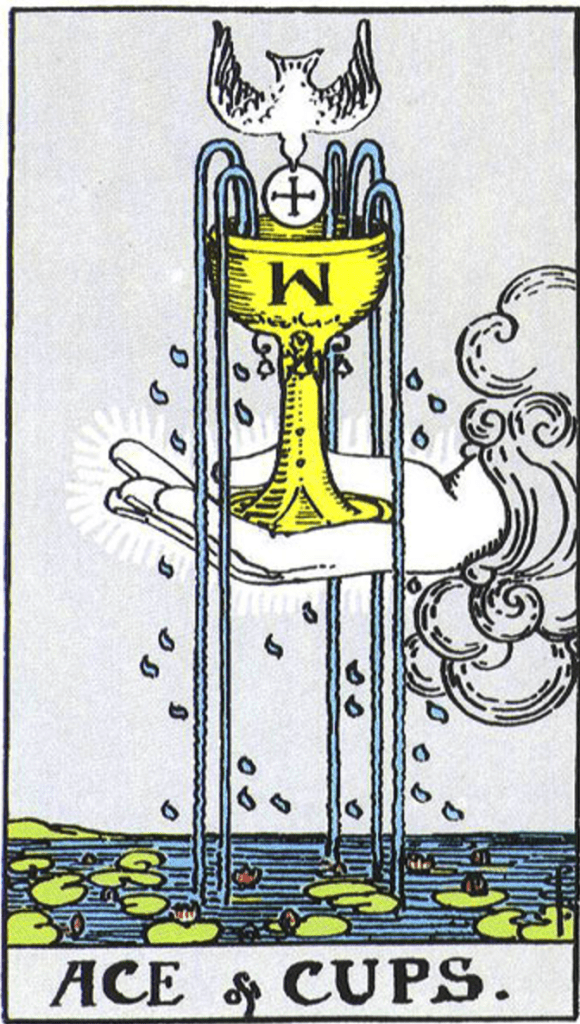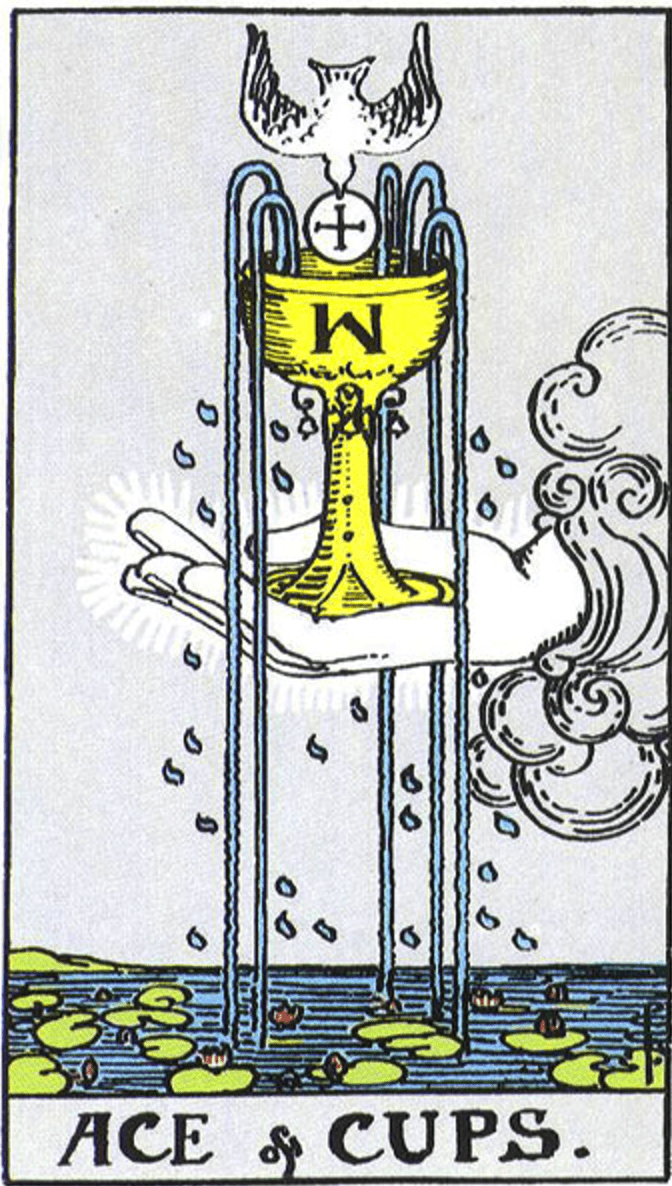
The Ace of Cups is the card of love, new feelings, emotional awakening, and creativity. This card shows a hand extending outward, offering an overflowing chalice to the viewer. The cup is overflowing with water, which symbolizes pure emotion, love, and happiness.
The Ace of Cups is a reminder of the outpouring of feelings and happiness at the start of a new cycle. A new cycle can begin at any time, whether it’s at the start of a new relationship or a rekindling of a spark in an ongoing relationship. The Ace of Cups reminds us to dig into our own creativity and intuition for the answers.
Upright Meaning:
If the Ace of Cups appears in a Tarot spread as a person, that means that this person is emotionally open, loving, and offers a deep sense of emotional fulfillment and compassion. They embody the essence of emotional generosity and warmth, often being a source of comfort and emotional support to those around them. The Ace of Cups person is seen as a beacon of love and empathy, drawing people in with their understanding and compassionate nature.
For physical characteristics, the Ace of Cups as a person represents someone who is often warm and inviting in appearance, with a comforting presence and a soft, empathetic gaze. Their demeanor may exude a sense of calm and understanding, often accompanied by a gentle and welcoming smile. This person’s appearance reflects their inner emotional warmth, making them approachable and nurturing in their interactions.
For emotional characteristics, the Ace of Cups as a person represents someone who is deeply empathetic, nurturing, and has a profound capacity for love and emotional connection. They possess a natural ability to understand and connect with others on an emotional level, often sensing and responding to the emotional needs of those around them. This individual’s emotional depth allows them to create meaningful and heartfelt connections, offering support and compassion to those they encounter.
Astrologically, the Ace of Cups as a person represents someone who is likely influenced by Cancer, signifying deep emotional sensitivity, intuition, and a nurturing spirit. This astrological influence endows them with an innate understanding of the emotional realm and a strong inclination toward caring for others. Their Cancerian traits contribute to their empathetic and protective nature, often making them a source of emotional security and comfort.
For careers, the Ace of Cups can represent someone who works in a caring or healing profession, such as a counselor, nurse, or any role that involves deep emotional engagement. They excel in environments where they can use their emotional intelligence and capacity for empathy to support and heal others. The Ace of Cups person’s professional life is typically characterized by their ability to connect deeply with others and to provide emotional support and understanding.
The Ace of Cups as a person represents someone who makes you feel loved and emotionally fulfilled, encouraging you to open your heart and embrace compassion and empathy. Their presence in your life can serve as a reminder of the importance of emotional openness and the healing power of love and understanding. This person’s influence inspires a sense of emotional richness and a deeper connection to the feelings of oneself and others.
Reversed Meaning:
If the Ace of Cups reversed appears in a Tarot spread as a person, that means that this person is emotionally closed off, may be experiencing emotional turmoil, or struggling with expressing their feelings. This reversal suggests a blockage in the flow of emotional energy, leading to challenges in forming deep emotional connections. The Ace of Cups reversed person may be dealing with internal emotional conflicts or an inability to share their feelings openly.
For physical characteristics, the Ace of Cups reversed as a person represents someone who may appear withdrawn or protective of themselves, often displaying a guarded demeanor. Their body language might be more closed off, and their expression less open, reflecting a reluctance to expose their emotional vulnerability. This person’s appearance can convey a sense of emotional reservation or a hesitancy to engage deeply with others.
For emotional characteristics, the Ace of Cups reversed as a person represents someone who is struggling with emotional expression, may feel emotionally drained, or has unhealed emotional wounds. They might find it challenging to connect with their own feelings or to express their emotions to others, often leading to a sense of emotional isolation or unfulfillment. This individual’s emotional state is likely marked by inner turmoil or a need for emotional healing.
Astrologically, the Ace of Cups reversed as a person represents someone who is dealing with the challenging aspects of Cancer, like moodiness, emotional insecurity, or over-sensitivity. Their astrological influences may manifest in a tendency to retreat emotionally or to struggle with maintaining emotional stability. The challenge for this person lies in overcoming their emotional barriers and learning to navigate their feelings in a healthy and expressive way.
For careers, the Ace of Cups reversed can represent someone who works in a role that requires emotional connection, but they are struggling to maintain their emotional well-being. They might be in a position where their ability to empathize and connect is hampered by their own emotional challenges, leading to professional difficulties. This person may need to focus on their emotional health and develop strategies to cope with their emotional struggles effectively.
The Ace of Cups reversed as a person represents someone who makes you feel the need to approach with sensitivity and understanding, highlighting the importance of emotional healing and expression. Their presence in your life can serve as a reminder of the complexities of emotional experiences and the necessity of addressing emotional wounds. This person’s influence encourages a thoughtful and compassionate approach to emotional interactions, underscoring the value of patience and empathy in fostering emotional well-being and open communication.
